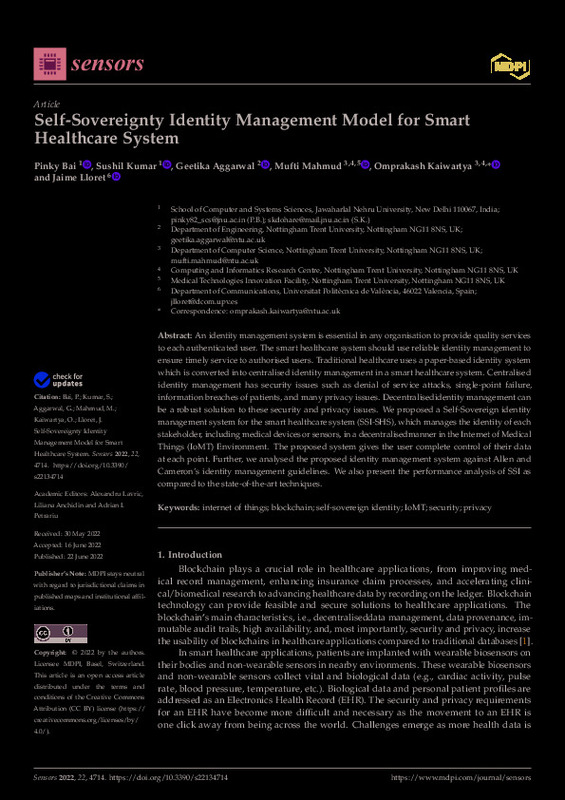JavaScript is disabled for your browser. Some features of this site may not work without it.
Buscar en RiuNet
Listar
Mi cuenta
Estadísticas
Ayuda RiuNet
Admin. UPV
Self-Sovereignty Identity Management Model for Smart Healthcare System
Mostrar el registro sencillo del ítem
Ficheros en el ítem
| dc.contributor.author | Bai, Pinky
|
es_ES |
| dc.contributor.author | Kumar, Sushil
|
es_ES |
| dc.contributor.author | Aggarwal, Geetika
|
es_ES |
| dc.contributor.author | Mahmud, Mufti
|
es_ES |
| dc.contributor.author | Kaiwartya, Omprakash
|
es_ES |
| dc.contributor.author | Lloret, Jaime
|
es_ES |
| dc.date.accessioned | 2024-01-23T19:01:06Z | |
| dc.date.available | 2024-01-23T19:01:06Z | |
| dc.date.issued | 2022-07 | es_ES |
| dc.identifier.uri | http://hdl.handle.net/10251/202085 | |
| dc.description.abstract | [EN] An identity management system is essential in any organisation to provide quality services to each authenticated user. The smart healthcare system should use reliable identity management to ensure timely service to authorised users. Traditional healthcare uses a paper-based identity system which is converted into centralised identity management in a smart healthcare system. Centralised identity management has security issues such as denial of service attacks, single-point failure, information breaches of patients, and many privacy issues. Decentralisedidentity management can be a robust solution to these security and privacy issues. We proposed a Self-Sovereign identity management system for the smart healthcare system (SSI-SHS), which manages the identity of each stakeholder, including medical devices or sensors, in a decentralisedmanner in the Internet of Medical Things (IoMT) Environment. The proposed system gives the user complete control of their data at each point. Further, we analysed the proposed identity management system against Allen and Cameron's identity management guidelines. We also present the performance analysis of SSI as compared to the state-of-the-art techniques. | es_ES |
| dc.description.sponsorship | This research is supported by the B11 unit of assessment, Center for Computing and Informatics Research Center, Department of Computer Science, Nottingham Trent University, UK. | es_ES |
| dc.language | Inglés | es_ES |
| dc.publisher | MDPI AG | es_ES |
| dc.relation.ispartof | Sensors | es_ES |
| dc.rights | Reconocimiento (by) | es_ES |
| dc.subject | Internet of things | es_ES |
| dc.subject | Blockchain | es_ES |
| dc.subject | Self-sovereign identity | es_ES |
| dc.subject | IoMT | es_ES |
| dc.subject | Security | es_ES |
| dc.subject | Privacy | es_ES |
| dc.subject.classification | INGENIERÍA TELEMÁTICA | es_ES |
| dc.title | Self-Sovereignty Identity Management Model for Smart Healthcare System | es_ES |
| dc.type | Artículo | es_ES |
| dc.identifier.doi | 10.3390/s22134714 | es_ES |
| dc.rights.accessRights | Abierto | es_ES |
| dc.contributor.affiliation | Universitat Politècnica de València. Escuela Politécnica Superior de Gandia - Escola Politècnica Superior de Gandia | es_ES |
| dc.description.bibliographicCitation | Bai, P.; Kumar, S.; Aggarwal, G.; Mahmud, M.; Kaiwartya, O.; Lloret, J. (2022). Self-Sovereignty Identity Management Model for Smart Healthcare System. Sensors. 22(13). https://doi.org/10.3390/s22134714 | es_ES |
| dc.description.accrualMethod | S | es_ES |
| dc.relation.publisherversion | https://doi.org/10.3390/s22134714 | es_ES |
| dc.type.version | info:eu-repo/semantics/publishedVersion | es_ES |
| dc.description.volume | 22 | es_ES |
| dc.description.issue | 13 | es_ES |
| dc.identifier.eissn | 1424-8220 | es_ES |
| dc.identifier.pmid | 35808211 | es_ES |
| dc.identifier.pmcid | PMC9269346 | es_ES |
| dc.relation.pasarela | S\506764 | es_ES |
| dc.contributor.funder | Nottingham Trent University | es_ES |








